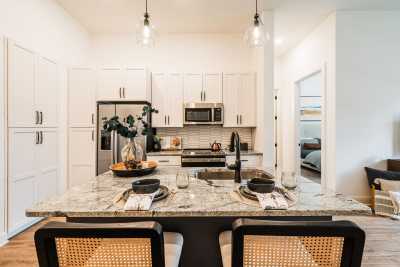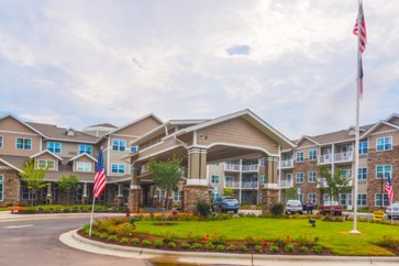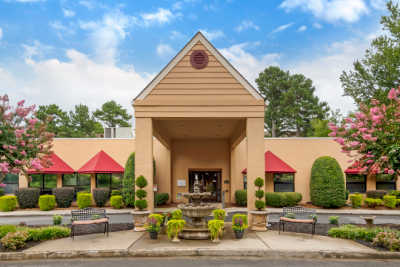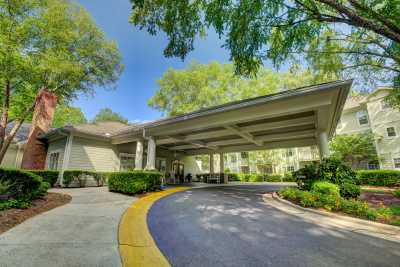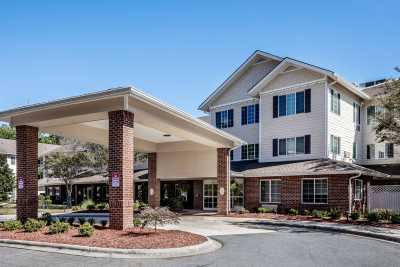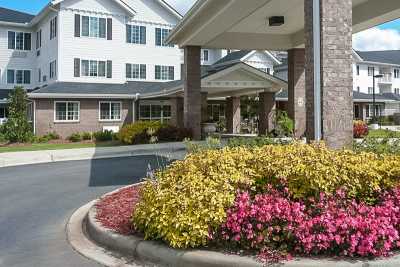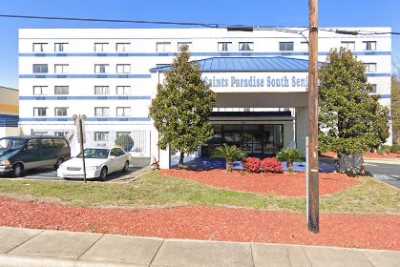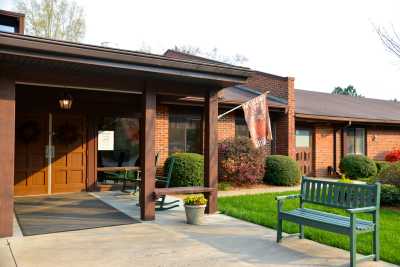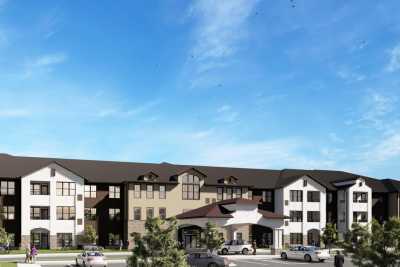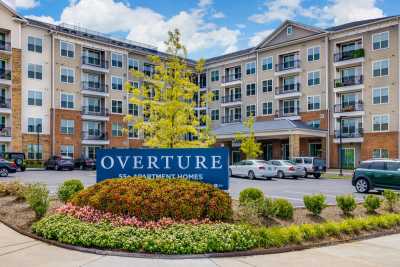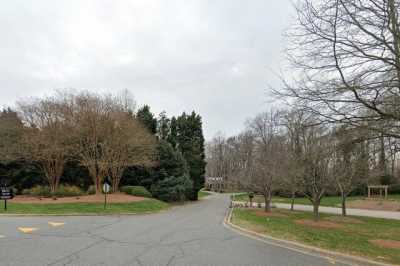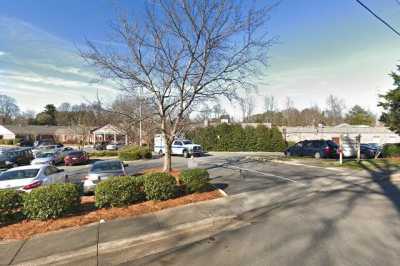
10 Best Independent Living Communities in Charlotte, NC
The Charlotte metro area offers many attractive lures for seniors who want to live their golden years like royalty. Charlotte, also known as the Queen City, has the energy of a big city while still maintaining small-town charm. Museums, decadent dining selections, and all-around beautiful outdoor spaces and weather are just a few of Charlotte’s attractions — and its selection of independent senior living communities is a reflection of that appeal. Independent living communities offer seniors all the perks of apartment-style living with extra services and amenities, such as housekeeping, meal services, and personal laundry.
A Place for Mom partners with nine independent senior living communities within a 10-mile radius of Uptown Charlotte, the lively city center. This deluxe guide to independent living in Charlotte is the optimal resource to help get you started on your search journey. It combines our 20+ years of experience in senior living with our proprietary rating system that’s based on location, facility transparency, and recent, high-quality reviews. We detail everything you need to know about Charlotte’s independent living communities, from favorite amenities to types of independent living communities to cost and payment methods. Additionally, you’ll find some highlights and local resources for seniors living in Charlotte.
Charlotte Independent Living Facilities | 524 Reviews
They were super accommodating during the moving in process. Everyone is very friendly, staff is very helpful as well. Building is clean and bright . Dining is good, Variety of selections on menu, and staff...
. This is a great place for older adults that need to downsize but still want to be a part of a group/ community. Would recommend highly. On site movie theater that shows movies every night after dinner....
Clean, well organized, lots of activities and she loves it. The location of town is not the best but being a gated community it is safe an d prices are good
Merrywood on Park is a great place. The apartments are spacious and clean. The staff is very responsive to all issues. Everyone is super friendly and helpful—employees and fellow residents. My dad enjoys...
Dining room dishes glasses Utensils often dirty / lipstick. PT referral for dad never processed /? Breakdown x 1 month . What's standard? Admin - listened to mom w feedback . No major changes done....
Staff is excellent. Apartments are comparable to standard size Of 1 bedroom apartment. Amenities includes weekly vacuuming, mopping, cleaning kitchenette/bathroom, changing bed linens/towels.
The food is mediocre but was something that was highlighted when we made our choice. Apartment size and activities are great.
I would tell others that it is a great safe place. There is a lot of things to do. The other residents and staff watch out for you. My loved one doesn't think a lot of the food. The breakfast is more of...
There are not enough words to describe Carmel Hills! It is the most wonderful loving place. My Mother lived there for 14 months and was taken better care of than I could ever imagine. The people that work...
Our free advisors can help
- Compare local facilities
- Determine care type
- Schedule tours
- Evaluate pricing
I'm very happy with Ambient at Austin Village. The facility is very clean. It's brand new. The tenants are very nice and friendly, and they all look out for each other. The setting is lovely - it backs...
I shop locally nearby at CVS, etc. Traffic is light to moderate (bank of am, chase, etc). Easy access to major banks. Wireless internet hookup adequate w/ heated swimming pool and foyer and exercise.
Located in nice community in Charlotte. Yes, we would recommend this community to other families based on the experience so far.
My mom and I needed in home help after she fell and broke her shoulder. This was our first time with using an in home facility and we could not have been more pleased. We had an awesome caretaker and never...
Our methodology
How we rank order the Charlotte community options above
We developed a proprietary recommendation system that orders Charlotte community options based on factors we know are important to seniors and their families:
- Proximity to your search location
- Availability of recent, high-quality reviews
- The amount of detailed community information available
Where we source our information
14,000+ communities
We collect proprietary data from our network of 14,000+ senior living communities in the U.S., with regular refreshes of data and information
350,000+ reviews
We have 387,000+ reviews from senior living residents and family members that provide first-hand accounts about senior living communities
- Costs of independent living in the Charlotte area
- What families are saying about independent living in Charlotte
- How people pay for independent living in Charlotte, NC
- Understand North Carolina laws and regulations for independent living communities
- Types of independent living in Charlotte, NC
- Charlotte independent living services and amenities
- Explore senior care with confidence
- Unfamiliar with Charlotte? Highlights for seniors
Costs of independent living in the Charlotte area
Independent living communities in Charlotte cost an average of $3,367 per month, according to our proprietary data.[01] This takes into account any additional fees and the cost of potential add-on services and fees, such as the following:
- One-time community entrance fee
- Monthly pet fees
- Monthly parking fees
- HOA fees in some communities
Some communities include certain costs in the standard monthly rent, such as utilities, cable, and Wi-Fi. Independent living communities also may offer options that are a la carte, meaning they can be added to your monthly rent individually for extra costs. The following services may be included in these costs:
- Housekeeping
- Salon services
- Personal laundry
- Transportation services
When touring independent living communities, you’ll want to ask what’s included in the baseline rent to avoid paying for any additional amenities or services you don’t want. The baseline rent, or starting costs, tends to look a little different from the one we provide above. You can take a look at what the starting costs of independent living in Charlotte look like below, particularly as they compare to other nearby locales.
Average monthly cost of Independent Living in Charlotte, NC vs. nearby cities
Average monthly cost of Independent Living in Charlotte, NC vs. the state and national average
Average monthly cost of Independent Living in Charlotte vs. other types of senior living
Median monthly costs of Independent Living in Charlotte, NC by room type
Average cost of Independent Living in Charlotte over time
What families are saying about independent living in Charlotte
Recent reviews for independent living in Charlotte
The Dorchester South in Pineville, NC
MerryWood on Park in Charlotte, NC
The Manor in Pineville, NC
Reviews mention these favorite features of communities
How people pay for independent living in Charlotte, NC
Many residents of independent living in Charlotte often use private funds to pay for community costs. Since these communities typically don’t provide the level of care provided in an assisted living or memory care facility, the services and living costs typically aren’t covered by Medicare, Medicaid, and long-term care insurance.
However, if a person residing in an independent living community experiences a medical need for in-home care services, those may be covered by Medicaid and Medicare. There are also public assistance and veterans benefits that some seniors may qualify for. We detail each of those private and public funding options below.
Many seniors use personal funds from savings or retirement income to pay for an independent living community in Charlotte. This can also look like any additional proceeds you can collect from the following sources:
Veterans may be able to pay for some of the costs of independent senior living in Charlotte by utilizing benefits from the Department of Veterans Affairs (VA) and the North Carolina Department of Military and Veteran Affairs (DMVA). You’ll find some of the benefits that could be available to qualified veterans provided below.
VA Pension
The VA Pension program gives supplemental monthly income to qualified veterans and their surviving spouses, which can be put toward the cost of an independent living community in Charlotte. To be eligible for a VA pension, a veteran must meet VA service and financial requirements and at least one of the prerequisites:
- They must be age 65 or older.
- They must have a permanent disability.
- They must be a nursing home patient due to a physical or mental disability.
- They must receive Supplemental Security Insurance (SSI) or Social Security Disability Insurance (SSDI).[03]
Aid and Attendance benefit
If a veteran receives VA pension benefits, they may also be eligible to collect the Aid and Attendance benefit. Aid and Attendance is paid in addition to a monthly pension amount and can be used to pay for any living costs that benefit a veteran’s quality of life, which does include the cost of an independent senior living community.
On top of already being enrolled in VA pensions, a veteran must also have a wartime service-related disability recognized by VA Health Care, and meet a minimum of one of the following conditions to qualify:
- They must have poor vision.
- They must need help with everyday tasks.
- They must be confined to bed for all or most of the day.
- They must be a patient in a nursing home because of a mental or physical disability. [04]
Housebound allowance
Another benefit available to veterans enrolled in VA pensions is the Housebound allowance. Like Aid and Attendance, the Housebound allowance is paid on top of a veteran’s monthly pension amount. Veterans can either receive Housebound allowance or Aid and Attendance, but not both at once.
Unlike Aid and Attendance, a veteran’s disability doesn’t have to be related to wartime service for them to receive the Housebound allowance — it can develop from natural, age-related causes. However, the Housebound allowance is mainly intended to cover the cost of in-home care services when a veteran isn’t able to leave their home.
Help with VA benefits
Numerous other local organizations in Charlotte can help veterans find and apply for VA benefits. NCServes is the statewide resource that can help connect veterans and their families to several local services. The Catholic Diocese of Charlotte helps Mecklenburg County veterans access case management services, which helps veterans access VA benefits. Disabled American Veterans (DAV) and Veterans of Foreign War (VFW) are some other nonprofits that may also be helpful when it comes to finding and accessing VA benefits. You can also reach out to the benefits specialists at your local VA service office.
Number of veterans who live in Charlotte, according to the U.S. Census Bureau
Around 63% of Charlotte veterans are age 55+, per the U.S. Census Bureau.
Resources for Charlotte veterans
Charlotte veterans service office
Locate a veterans service officer
5500 Executive Center Drive, Suite 132
Charlotte, NC 28212
Phone: 919-664-1080
North Carolina Department of Military and Veterans Affairs
413 N. Salisbury St.
Raleigh, NC 27603
Phone: 844-624-8387
Disabled American Veterans (DAV)
251 N. Main St., Room 151
Winston-Salem, NC 27101-3914
Phone: 336-631-5481
Veterans of Foreign War (VFW)
Veteran benefits and assistance
2831 The Plaza
Charlotte, NC 28205
Phone: 704-332-2669
NCServes – Metrolina
Assistance request form for benefits navigation and other services
2200 E. 7th St.
Charlotte, NC 28204
Phone: 855-425-8838
Catholic Charities Diocese of Charlotte
Supportive services for veterans
1123 E. Church St.
Charlotte, NC 28203
Phone: 704-370-3257
NC Medicaid is North Carolina’s Medicaid program. While it can’t be used to pay for the cost of living in an independent senior living community, there may be some in-home care services that could be covered if there’s a medical need for them. NC Medicaid has some specified Long-Term Services and Supports (LTSS) that can help seniors receive care services from home instead of an institutional setting, such as a hospital or nursing home. Read on to learn more about these LTSS services and what they cover.
Personal care services
Personal care services provide support with everyday tasks for seniors who struggle to do the following independently:
- Eat
- Bathe
- Get dressed
- Go to the restroom
- Move around their home[06]
Program of All-Inclusive Care for the Elderly (PACE)
Elderly adults may be able to receive several long-term services from their home or independent living community through the Program of All-Inclusive Care for the Elderly (PACE). The program helps seniors avoid placement in an institutional setting, such as a nursing home. Seniors may be eligible to participate in PACE if they can pay with private funds and are either enrolled in Medicare, Medicaid, or are eligible for both programs.
This additional criteria also needs to be met to receive PACE services:
- A senior must be age 55 or older.
- A senior must need a nursing home level of care.
- A senior must live in a PACE organization service area.
- A senior must be able to live in their community without putting their health or safety at risk.
- A senior must meet NC Medicaid’s financial eligibility requirements for long-term care.[19]
Medicaid assistance
Your local Area on Agency can help you navigate Medicaid and LTSS. The NC Medicaid Ombudsman is another source available to help. NC Medicaid beneficiaries can also utilize the NC Medicaid Ombudsman, which helps provides updates about any program changes. It also connects recipients to useful resources that offer the following assistance:
- Legal aid
- Housing and social services
- Food and nutrition assistance
Charlotte resident Medicaid resources
Long-term senior services and support
10735 David Taylor Drive, Suite 250
Charlotte, NC 28262
Phone: 704-372-2416
Learn more about NC Medicaid Ombudsman
Phone: 877-201-3750
Similar to NC Medicaid, Medicare doesn’t pay for the cost to live in an independent senior living community in Charlotte, North Carolina. However, some Medicare-approved health services can be provided in an independent living community if a medical need arises. Eligible seniors may be able to receive these short-term home care services:
- Medical social services
- Intermittent skilled nursing care
- Medical supplies and/or durable medical equipment
- Physical, speech, and occupational therapies[07]
Seniors must already be enrolled in Medicare Part A and/or Part B to qualify. Additionally, they must meet all of the following requirements:
- Be homebound due to a condition or illness
- Require specialized therapy and/or part-time skilled nursing for a specific condition
- Be under a doctor’s care with a regularly reviewed care plan[07]
A part of the North Carolina Department of Insurance, the Senior Health Insurance Information Program (SHIIP) provides Medicare education to seniors through its North Carolina Senior Medicare Patrol (NCSMP). Through NCSMP, seniors can absorb all sorts of useful information from trained SHIIP counselors about Medicare benefits, how to recognize billing errors, and other potential discrepancies to look out for.
Additional Medicare resources
Albemarle Building
325 N. Salisbury St.
Raleigh, NC 27603-5926
Phone: 855-408-1201
Seniors who don’t require the types of services covered by Medicare and Medicaid may be able to utilize the following other forms of public assistance.
Housing Choice Vouchers
Also known as Section 8, the Housing Choice Voucher (HCV) program helps low-income seniors afford safe and affordable housing in Charlotte. This program gives eligible recipients a voucher that pays a landlord for some of the monthly rent and utility expenses. Federally funded by the Department of Housing and Urban Development, HCV is administered locally by public housing authorities, such as Charlotte’s INLIVIAN, to make sure private landlords are properly compensated.
The rent subsidy is usually capped at 30% of a person’s monthly income, and eligibility is based on several factors, including a household’s size and income. You’ll want to check with an independent living community first to make sure they participate in the HCV program. Additionally, HCVP recipients also need to follow program rules that include the following conditions:
- Participants must report changes in household size or income.
- Participants must keep the unit in adequate condition.
- Participants must not violate any lease terms.[08]
You can reach out directly to INLIVIAN or the nearest HUD office in Greensboro for help applying for the HCVP or general questions.
Social Security benefits
Eligible seniors can receive supplemental income from Social Security benefits, which can be put towards any expenses incurred to live in an independent senior living community. Different types of Social Security benefits have distinct applications and benefits processes. Understanding which one best applies to your situation can help you avoid being denied benefits. Read on to find out which benefit may be available to you.
- Social Security Survivors Pension is intended to help a widow or widower of eligible workers and doesn’t require a disability.
- Supplemental Security Income (also SSI) is aimed at helping people with a disability, limited income, and no work credits.
- Social Security Disability Insurance (SSDI) is given to individuals and certain family members that meet disability and work credit requirements.
- Social Security in Retirement (SSR or Social Security Retirement benefit) can be used to supplement some of a person’s income if they retire or work fewer hours.
Your local Social Security Administration office can provide more information about these benefits.
Local resources
Emergency housing assistance organizations help Charlotte residents who need financial assistance or are at risk of homelessness. The Crisis Assistance Ministry is one local nonprofit that can provide instant emergency rent and utility support for individuals facing eviction or utility shutoff. You can access other resources to help with rent and utilities by dialing 2-1-1.
Public assistance resources for Charlotte residents
400 East Blvd.
Charlotte, NC 28203
Phone: 704-336-5183
Asheville Building
1500 Pinecroft Road, Suite 401
Greensboro, NC 27407-3838
Phone: 336-547-4000
2201 Coronation Blvd., #100
Charlotte, NC 28227
Phone: 800-772-1213
For emergency financial assistance
500-A Spratt St.
Charlotte, NC 28206
Phone: 704-371-3001
Understand North Carolina laws and regulations for independent living communities
Stand-alone independent living communities in Charlotte aren’t regulated by the state and often aren’t licensed to provide medical care or other supportive services. For the most part, North Carolina considers independent living communities the same as senior apartments. This means independent senior living communities must comply with Charlotte’s minimum housing code, which is enforced by code inspectors who observe and report any of the following violations:
- Loose flooring
- Broken windows
- Unsafe ceiling or roof
- Leaking roof or plumbing fixtures
- Hazardous wiring
- Damaged structural supports
- Stained or water-damaged interior walls[10]
Residents at an independent senior living community can expect a landlord-tenant type of relationship. This means that property owners and tenants are expected to meet certain responsibilities outlined in the North Carolina Legal Aid brochure on Landlord-Tenant laws. We detail some expectations for both parties below, as well as anti-discrimination housing laws.
Responsibilities of landlords
Owners of rental properties are required to keep the building and units in safe and suitable conditions for residents. By law, landlords in North Carolina must do the following:
- Keep plumbing, heating, and electric equipment in safe working order
- Provide smoke alarms
- Make all necessary repairs
- Fix all broken-down appliances, if provided by the landlord
- Inform residents if they sell the property
- Keep all common areas, such as hallways and stairways, clear and in a safe condition[11]
Tenant responsibilities
Tenants must also own their fair share of responsibilities when renting a property in North Carolina. The state law requires tenants to do the following:
- Properly dispose of trash
- Avoid unnecessary damages caused by tenants or guests
- Provide proper notice of your intention to move at the end of a lease
- Keep the unit clean
- Pay rent on time[11]
Fair housing
In North Carolina, all rental properties have to follow federal and state antidiscrimination housing laws. The Fair Housing Act, in particular, prohibits landlords from denying a tenant to lease a property from them because of the characteristics below:
- Race
- Religion
- Sex
- Disability
- Family status (unless they meet the housing for older persons exemption[12])
Reasonable accommodations and modifications for people with disabilities
Under the Americans with Disabilities Act (ADA), landlords are required to make reasonable accommodations and modifications to a property if it gives disabled individuals equal access to the spaces. Accommodation can look like any changes or exemptions to certain policies, while modifications are constructional adjustments to the building. Both accommodations and modifications help people with disabilities enjoy their units or common areas to the fullest.
Landlords must also let tenants make reasonable modifications to their personal living spaces. Some examples of these modifications are listed below:
- Installing grab bars
- Widening doorways
- Lowering light switches
- Installing ramps at building entrances[13]
If you have concerns about a community not complying with the city’s minimum housing code, you can report violations on the Charlotte Housing and Neighborhoods Services page or dial 3-1-1 to request an inspection.
Charlotte Housing and Neighborhood Services
View code enforcement cases in Charlotte
600 E. Trade St.
Charlotte, NC 28202
Phone: 704-336-3380
Legal Aid of North Carolina
Phone: 877-579-7562
COVID-19 regulations for Charlotte independent living communities
As of February 2023, North Carolina doesn’t have any COVID-19 regulations or mandates in place for independent living communities. However, COVID-19 and its variants continue to be a threat to high-risk populations like seniors. You can check directly with prospective independent living communities about any precautions they may have in place to keep residents and staff safe.
COVID-19 resources for Charlotte veterans
NC Department of Health and Human Services (DHHS) resources
Find a COVID-19 testing site near you
For the latest local guidance and updates, you can check the North Carolina Department of Health and Human Services (DHHS) COVID-19 recommendations. Here’s a brief rundown of what the DHHS is currently recommending:

Staff safety. Employers should follow the Centers for Disease Control and Prevention’s isolation and quarantine protocols for employees who test positive for or were exposed to someone with COVID-19.

Social distancing. DHSS continues to recommend staying 6 feet apart in all public settings.

Masking. Masks are encouraged in indoor public spaces, especially if you’re unvaccinated or in a setting with high-risk populations.

Vaccinations. The DHSS recommends North Carolinians stay up to date on COVID-19 vaccines and boosters.
Types of independent living in Charlotte, NC
Independent living communities in Charlotte deliver the royal treatment to active seniors looking to retire in the Queen City. These communities range from stand-alone independent living communities to ones that also offer assisted living and memory care services. Whether you prefer proximity to nature or Charlotte’s popular attractions, these independent living communities have something to offer all.
Woodland wonders
Settle into the countryside for a more rustic approach to senior independent living in Charlotte. These craftsman-style communities can be found within Charlotte’s quieter suburban settings. Most have a rustic, homelike ambiance with cozy furnishings and common areas with inviting fireplaces.
These communities offer nearly unlimited access to the area’s beautiful surroundings with waterfront views, plentiful golf courses, and scenic parks nearby. Whether you prefer to spend your days tending to the raised garden beds or dropping into cooking demonstrations, these scenic retreats offer ample opportunities to pursue your passions and interests.
Additionally, most of these communities offer add-on options that may include the following:
- Daily chef-prepared meals
- Fitness programs
- Coordinated activities
- Personal laundry and linen
- Transportation arrangements
- Weekly housekeeping
Boutique independent living
Experience Charlotte independent senior living at its finest in these chic, sophisticated communities. These homes offer regal senior living with palatial living spaces equipped with full-sized kitchens, marble countertops, and walk-in showers.
While many of these independent living communities boast close access to Charlotte’s shopping, restaurants, and lively cultural scene, you may find you have everything you need at home, with so many lavish amenities available on-site. Many offer complimentary concierge services, as well as all-inclusive options like housekeeping, personal training, and dry-cleaning services.
Enjoy the best of resort-style living with posh indoor and outdoor common spaces that often include these amenities:
- Movie theaters
- Outdoor patios
- Grilling stations
- Bistros
- Bocce courts
- Yoga studios
Charlotte independent living services and amenities
Availability of select dietary accommodations in Charlotte independent living
Availability of select dining options in Charlotte independent living
Availability of select programs and activities in Charlotte independent living
Explore senior care with confidence
Know where to start.
Identify the right care for your loved one with our free assessment.

See what you can afford.
Understand cost and payment for long-term care based on your loved one's needs.

Find top facilities for you.
Free, personalized guidance from our Senior Living Advisors can help you narrow your search.

Tour your favorite facilities.
Our free touring checklist can help you choose the right community.
Unfamiliar with Charlotte? Highlights for seniors
Number of seniors over the age of 65 currently living in Charlotte, North Carolina
Percentage of Charlotte seniors 65 and older without a disability
Average annual income for Charlotte seniors 65 and older
Health care for seniors in Charlotte
Charlotte has access to some of the top health systems and medical facilities in the region. Get to know some of the area’s best health care providers below.

Novant Health First Charlotte Physicians Epicentre
Novant Health First Charlotte Physicians Epicentre provides primary care services to adults from the heart of Uptown Charlotte. It provides preventative care services from a team of internal medicine specialists, as well as treatment for illness and injuries. Additionally, Novant Health First Charlotte offers on-site services that include cardiac stress tests, audiograms for hearing loss detection, and an allergy injection clinic.

Atrium Health Cabarrus
Atrium Health Cabarrus is located just outside of Charlotte in Concord, North Carolina. This nonprofit hospital offers comprehensive cancer and cardiac care, round-the-clock emergency medical treatments, as well as general and specialized surgical procedures. Its Levine Cancer Institute-Concord provides acclaimed cancer treatment from chemotherapy to radiation, and it has several supportive services available for patients and families.

CaroMont Regional Medical Center
CaroMount Health is an acute care hospital that sits about 30 minutes outside of Charlotte in Gastonia, North Carolina. It’s part of the CaroMont Health regional health system and is nationally acknowledged for its exceptional cardiac care, specialized orthopedic care, and Cancer Center. Specially trained traumatologists are available around the clock to provide a range of services to patients with critical injuries.
Transportation for seniors in Charlotte
While 77% of our partnered independent communities have complimentary transportation, it’s crucial to have other reliable transportation available when maintaining one’s independence.[01] Charlotte Area Transit System (CATS) is the city’s main form of public transportation and operates numerous bus and rail lines throughout the metro, as well as paratransit services for disabled individuals who can’t access its fixed routes.
The Mecklenburg Transportation System (MTS) may also be able to help seniors access nonemergency transportation services in Charlotte. Read on to learn more about some of these transportation services and who may be eligible:
- Medicaid transportation. With this service, seniors eligible for Medicaid may be available to receive transportation to and from medical appointments.
- Elderly general purpose. This service is available to seniors age 60+ who don’t live in an assisted living facility or nursing home.
- Veterans services transportation. This service is for qualified veterans who need assistance getting to and from medical clinics in Charlotte and VA hospitals in North Carolina.
- Urbanized area general purpose. Seniors age 60 and older living within Charlotte can receive nonemergency transportation to locations such as beauty salons, grocery stores, and recreational centers.[16]
Many Charlotte residents often rely on cars to run errands or get around town. Below, we provide Charlotte’s rankings for the city’s proximity to amenities within a five-minute walk, its access to nearby transportation, and its bike infrastructure.[17]

Walk Score

Transit Score

Bike Score
Senior activities in Charlotte
Sure, pleasant weather and sensible cost of living are some of the commonly known appealing qualities that draw people to Charlotte. But what else does the Queen City have to offer seniors considering independent living in Charlotte, North Carolina?
Charlotte offers the royal tree-tment
Charlotte’s enticing, tree-dense geography provides a wealth of outdoor destinations that include more than 200 parks and nature preserves. The city has over 45% tree canopy coverage, as well as ample parks, trails, and stunning foliage. You’ll also find botanic bliss at one of the city’s majestic gardens:
- UNC Charlotte Botanical Gardens
- McGill Rose Garden
- Daniel Stowe Botanical Garden
- Wing Haven Garden and Bird Sanctuary
Charlotte is a dining dynasty
Charlotte’s rapidly growing restaurant scene offers a range of culinary selections to satisfy every craving. Barbecue is king in the Queen City, and there are plenty of spots to get your fix of masterfully smoked Carolina ‘cue. From South American fare to Southern brunch specialties, Charlotte has a zest for serving up delectable dishes.
Charlotte has imperial shopping
Shopping is a cherished pastime in Charlotte, and you’ll find plenty of options for every budget and style at the local malls and outlet spots. For unique treasure hunters, the ample local shops and boutiques are treasure troves for one-of-a-kind finds. Meanwhile, Charlotte’s open-air shopping districts provide a divine retail experience at these popular locations:
Charlotte is a sports empire
From community watch parties to local taverns and cigar bars, there’s ample opportunity to partake in Charlotte’s sports culture. This city is very much a sports dominion with several professional teams, including the Carolina Panthers and Charlotte Hornets. It’s also the site of the NASCAR Hall of Fame. Additionally, Charlotte hosts college football’s annual ACC Championship Game and New Year’s Eve Belk Bowl, as well as the PGA Wells Fargo Championship for golf.
Charlotte has a reigning arts and culture scene
Arts and culture are central in Charlotte, and the city itself is a masterpiece of creative expression. You’ll find plenty of opportunities to immerse yourself in the cultural scene from the public art and murals throughout the city to these popular artistic attractions:
Frequently Asked Questions
Trevi Vibrant Senior Living, Chandler Place Independent Living and Greenway Square Retirement Community are the top-rated Independent Living facilities near Charlotte, NC. These Independent Living facilities received the highest rankings based on verified family reviews. See full list of communities.
The average cost of Independent Living in Charlotte is $3,516 per month. This cost may vary based on location, amenities, floorplan, level of care and other factors.
References
A Place for Mom. (2022). A Place for Mom proprietary data.
U.S. Census Bureau. (2021). Veteran status (S2101). [Data set]. American community survey.
U.S. Department of Veterans Affairs. (2022, October 12). Eligibility for Veterans Pension.
U.S. Department of Veterans Affairs. (2022, October 12). VA Aid and Attendance benefits and Housebound allowance.
U.S. Department of Veterans Affairs. (2021, March). Department of Veterans Affairs Supportive Services for Veteran Families (SSVF) program.
State of North Carolina Department of Health and Human Services. (2022, February). Fact sheet LTSS service description and requirements.
Medicare.gov. Home health services.
U.S. Department of Housing and Urban Development. Housing choice voucher fact sheet.
U.S. Department of Housing and Urban Development. Section 202 Supportive Housing for the Elderly program.
Code of Ordinances City of Charlotte, North Carolina. (2022, November 23). The housing code of the city of Charlotte, Chapter 11: Housing. Municode Library.
Legal Aid of North Carolina. Landlord/tenant law.
U.S. Department of Housing and Urban Development. Housing discrimination under the Fair Housing Act.
U.S. Department of Housing and Urban Development. Reasonable accommodations and modifications.
NC Department of Health and Human Services. (2022, September 06). Protecting each other from COVID-19.
United States Census Bureau. (2021). Population 65 years and older in the United States (S0103) [Data set]. American community survey.
Mecklenburg County, NC. Department of Social Services. Mecklenburg transportation system (MTS).
Walk Score. (2022). Living in Charlotte.
City of Charlotte. (2019, February 04). Tree canopy assessment.
North Carolina Medicaid Division of Health Benefits. Program of All-Inclusive Care for the Elderly (PACE).

More questions?
Ask an A Place for Mom local advisor at no cost.
- Monroe, North Carolina
- Fort Mill, South Carolina
- Matthews, North Carolina
- Mint Hill, North Carolina
- Huntersville, North Carolina
- Concord, North Carolina
- Davidson, North Carolina
- Gastonia, North Carolina
- Lake Wylie, South Carolina
- Rock Hill, South Carolina
- Indian Trail, North Carolina
- Tega Cay, South Carolina
- Cornelius, North Carolina
- Belmont, North Carolina
- Kannapolis, North Carolina
- Waxhaw, North Carolina
- Pineville, North Carolina
- Harrisburg, North Carolina
- Stanley, North Carolina
- Locust, North Carolina


